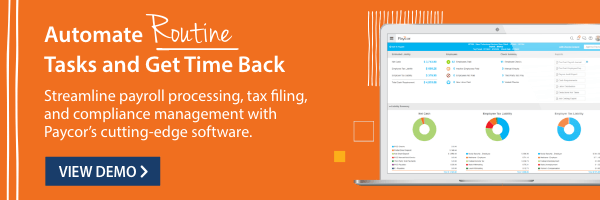It doesn’t take much business experience to know that getting your compensation strategy right is crucial for recruiting and retaining top talent. But paying employees isn’t simply a question of “how much?”. You’ll also want to consider your payroll options, or how to pay employees as well, especially if you manage hourly workers with different types of wages. Did you know:
- Almost a quarter of American households are unbanked or underbanked (The Federal Reserve). Either they don’t have a bank account or, if they do, still rely on non-traditional financial services such as payday loans or check-cashing services.
- More than 78% of employees surveyed said that they’d find it somewhat to very difficult to meet their current financial obligations if their paycheck was delayed a week (American Payroll Association).
- And finally, 80% of workers want their employer to provide benefits that directly affect their financial wellbeing.
If you consider these facts, especially in this intense war for talent, you’ll understand why finding the right payment methods and paying employees faster is not only crucial, it could also give you a competitive advantage. And, for hourly workers such as those in healthcare, manufacturing, and restaurant industries with turnover as high as 150%, HR leaders must find creative ways to attract talent and keep high performers engaged during these turbulent times. Let’s take a look at the options.
RELATED: What is On-Demand Pay? Key Benefits to Employees and Employers
How Can Employers Pay Employees Faster?
Today, payroll providers offer a number of ways for employers to pay employees that don’t involve a trip to the bank. In addition to the traditional paper paycheck, payroll options include:
- Direct deposit
- Cash
- Physical pay cards
- Digital pay cards/Digital wallet payment
It’s important to note here that employers can also pay employees faster by activating something called earned wage access (EWA), also known as on-demand pay. This benefit enables employees to view and access wages they’ve already earned and deposit funds into a bank account, onto a physical card, into a digital wallet app, or get cash from a participating retailer.
Offer employees more flexible pay options with Earned Wage Access
Many employees can’t afford to wait two weeks for payday. That’s why Paycor offers flexible pay options you can use to support your workforce, increase retention, and attract talent.
With OnDemand Pay built directly into our payroll solution, Paycor helps by enabling you to provide employees access to their earned wages, and it’s available to all Paycor customers. Additionally, with OnDemand Pay, workers can easily access earned wages through a physical pay card or a digital pay card (Paycor Visa® Card) that can be spent using a digital wallet (the Mobile Wallet within the Paycor Mobile app). By empowering employees to see what they’ve earned and access funds when they need it through Paycor Mobile, the peace of mind can have a positive emotional effect on employees who will come to work less stressed.
Paycor’s Mobile Wallet feature offers employees secure, timely access to wages and additional resources such as financial wellness and counseling.
Key benefits include:
- Receive direct deposit up to 2 days before payday with the Paycor Card
- Access budgeting tools and goal-based savings to manage income
- Track earnings, bills, and spending in one place
- Access free financial counseling or self-paced courses to help plan for the future
The Benefits of Using Direct Deposit
The most popular method of paying workers is through direct deposit. In fact, more than 95% of employees get paid this way, according to the American Payroll Association’s 2023 “Getting Paid in America” survey. When you consider the advantages, this is unsurprising:
- Instant Funds for (Most) Employees
If employees have an accessible bank account, they can get their pay instantly. No more queuing up at the bank then being forced to wait for the funds to clear. This accessibility and convenience is especially useful for paying employees who are remote, on vacation, or just busy. - No Printing Cost
Direct deposit saves employers the time and cost of printing (or worse, handwriting) individual pay checks each pay period. (Some state laws mandate physical pay stubs—see below for more). - Data Security
When you go paperless, there’s less sensitive information out there that could end up in the wrong hands. - Reduced Chance of Fraud
Checks and payroll cards can be lost or stolen, whereas with direct debit you know immediately that an employee’s pay has ended up in the right hands. - No Employee Fees and Costs
Employees want to be to use as much of their pay as possible, and direct deposit should mean they avoid wasting big chunks of their wages on fees.
What Is a Pay Card?
Pay cards are cards through which employees receive wages in place of paper checks or direct deposit. Employers load their employee’s pay onto a pre-paid debit card at the end of each pay period. This method gives employers a way to pay employees electronically, while catering to all employees, not just those who have a conventional banking setup.
How Are Employers Using Pay Cards?
Employees are given a card with a PIN which is automatically reloaded each pay period. Employees can withdraw money or make purchases just like they would with a traditional debit card.
There are a few reasons employers might consider this a viable option:
- Instant Funds Availability for Unbanked and Underbanked Employees
Payroll cards put salaries in the hands of all employees, no matter their banking setup. New employees won’t be forced to create new accounts to be paid. Unlike with paper checks, unbanked employees aren’t forced to pay fees to predatory cash-checking services. - No Fees for Employees
Just like direct deposit, employees should be able to access their funds without cost. - Paperless Possibilities
Payroll cards offer companies an alternative way to cut down on the time and cost spent printing checks, while improving record keeping. - Multiple Uses
All benefits and reimbursements can be transferred to the same card, keeping things simple for you and your employees. - Employee Protection
Payroll cards are essentially debit cards, and they receive the same protection from the Federal Deposit Insurance Corporation (FDIC) against fraud or loss.
How Can Employers Use Digital Wallet Payments for Employees?
To help make things even easier for employees, pay cards can also be used and stored completely digitally, expediting payment and eliminating the wait for physical cards. Employees just opt to securely store their pay card information within a virtual wallet app on their smartphone.
Choosing the Right Payment Method Based on Employee Preferences
Now that many American workers are looking for help with financial wellbeing (80% to be exact) it might help to consider all the options available to help them alleviate financial stress. Employees can be more focused at work when they’re not consumed with worry about their financial situations. Additionally, it’s been proven that employees with early access to earned wages are more likely to stay at a company longer and have increased morale (HBS 2022).
Be Aware of the Risks of Pay Cards
- Provide more than one option
Legally, employers must offer an alternative to payroll cards—such as paper checks or direct deposit. - Potential Costs
Employers can be assessed fees to set up and maintain a payroll card program. And while they aren’t allowed to pass these fees on to employees, ATM fees and transaction costs can still eat into salaries. - The Inconvenience of Lost Cards
The FDIC does offer protections, but we all know that in reality it’s rarely that simple. If a card is lost or stolen, employees might not realize immediately. When they do, they could end up low on cash while waiting for cards to be replaced and funds reimbursed. - Beware of Local Regulations and Compliance
Before implementing a payroll card program, employers should look out for any state or local legislation regulating or limiting the use of payroll cards.
Don’t Forget Paystubs
Remember, even if you’re attempting to go paperless, check the legislation in your state. Many states require employers to offer pay stubs, and some specify these must be printed and include tax withholding and benefits information.
How Paycor Helps
Finding the best way to pay employees isn’t easy, but partnering with the right payroll provider can help. Paycor offers multiple payment methods with greater flexibility and mobility, including direct deposit, payroll cards, OnDemand Pay, Mobile Wallet payment, and paper checks. What’s more, we automate the creation of pay stubs to comply with labor laws wherever you are. Our intuitive and easy-to-use software simplifies the entire payroll process and with dedicated support from HR experts, you can be sure you’re always compliant with ever-changing regulations.





